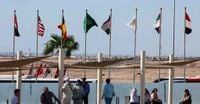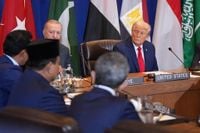The shimmering shores of Sharm El-Sheikh are once again set to become the epicenter of Middle Eastern diplomacy, as world leaders descend on the Egyptian resort city for a high-stakes peace summit aimed at ending the devastating Gaza war. Scheduled for Monday, October 13, 2025, the summit will be co-chaired by Egyptian President Abdel Fattah el-Sisi and U.S. President Donald Trump, marking a pivotal attempt to broker lasting peace in a region scarred by two years of bloodshed and political turmoil.
According to a statement from Egypt’s presidency, more than 20 heads of state and senior officials will participate in the summit, with the stated goal of ending the war in the Gaza Strip, strengthening efforts to achieve peace and stability in the Middle East, and launching a new era of regional security. The gathering, as reported by Reuters, will also address the early reconstruction of Gaza and the humanitarian crisis gripping the enclave after years of conflict.
In a move that has raised both eyebrows and hopes, the United States extended an invitation to Iran to attend the summit. Axios, citing U.S. officials, described the Trump administration’s decision to invite Iranian President Masoud Pezeshkian as a rare gesture, especially given the fraught history between Washington and Tehran. Iran has yet to confirm its participation, but its inclusion signals an acknowledgment of its influence in the region and the complex web of alliances shaping the conflict. As Sky News Arabia noted, the invitation list has expanded to include countries such as Spain, Japan, India, Armenia, Azerbaijan, Hungary, El Salvador, Cyprus, Greece, Bahrain, Kuwait, and Canada, alongside heavyweights like Germany, France, the UK, Italy, the UAE, Qatar, Jordan, Turkey, Saudi Arabia, Pakistan, and Indonesia.
Curiously, Israel is not expected to attend the summit, despite being at the heart of the conflict. Axios and Euro News both confirmed that Israeli officials would not be present in Sharm El-Sheikh, although President Trump is scheduled to visit Israel earlier in the day to meet with Prime Minister Benjamin Netanyahu and address the Knesset. This diplomatic choreography underscores the delicate balancing act required to bring together so many disparate actors—many of whom have sharply divergent interests and deep-seated grievances.
The summit follows a flurry of indirect talks between Palestinian and Israeli delegations in Sharm El-Sheikh last week, where a breakthrough was achieved. On October 9, Hamas officially announced an agreement to end the war in Gaza and exchange prisoners, a move that has set the stage for the summit’s ambitious agenda. The ceasefire, brokered with the mediation of Qatar, Egypt, and Turkey, has already had tangible effects on the ground. Gaza’s civil defense agency reported that more than 500,000 people have returned to Gaza City since the ceasefire took effect on October 10, a testament to the fragile hope now flickering in the war-torn territory.
As the first phase of the peace plan gets underway, Israel has begun transferring Palestinian prisoners to two jails ahead of their expected release in exchange for hostages held by Hamas. According to Reuters, approximately 2,000 prisoners are set to be freed, including 250 serving long sentences for serious security offenses. However, the list pointedly excludes high-profile detainee Marwan Barghouti, with Prime Minister Netanyahu’s office confirming its refusal to release him.
The peace plan, as outlined by President Trump and reported by Euro News, envisions Israel maintaining a military presence along Gaza’s border, while an international force—composed largely of troops from Arab and Muslim nations—oversees security within Gaza. The United States would spearhead a major, internationally funded reconstruction effort, aiming to rebuild the enclave’s shattered infrastructure and restore basic services. The World Food Programme has already begun scaling up its operations, with over 170,000 metric tons of food ready for dispatch through multiple corridors, as the ceasefire paves the way for humanitarian agencies to resume work in previously inaccessible areas.
Despite the outward momentum, significant obstacles remain. Hamas, for its part, has flatly rejected the idea of disarmament as part of the peace plan. Speaking to AFP, a Hamas official declared, “The proposed weapons handover is out of the question and not negotiable.” President Trump has indicated that the disarmament issue will be addressed in the second phase of the peace process, but resistance from Hamas suggests that consensus is far from guaranteed.
Iran’s position remains complex and, at times, contradictory. While Foreign Minister Abbas Araghchi acknowledged that Iran supports “parts” of Trump’s plan, he also warned, “We warn about the tricks and betrayals of the Zionist regime regarding previous agreements... There is absolutely no trust in the Zionist regime,” as reported by AFP. On October 11, Araghchi dismissed Trump’s suggestion that Iran could normalize relations with Israel as “wishful thinking,” stating unequivocally, “Iran will never recognize an occupied regime that has committed genocide and killed children.” Iran has also rebuffed efforts by European nations to restart nuclear talks, citing a lack of trust and the imposition of renewed UN sanctions.
The summit’s significance has not gone unnoticed by international observers. British Prime Minister Keir Starmer, French President Emmanuel Macron, and Ukrainian President Volodymyr Zelenskyy have all voiced support for the ceasefire and the diplomatic efforts underpinning the agreement. Starmer, who plans to attend the summit, praised the role of the United States, Egypt, Qatar, and Turkey in brokering the deal, describing the moment as a “historic turning point.” He is expected to call for continued international coordination to implement the next phase of the plan, which includes deploying a ceasefire monitoring mission and establishing transitional governance in Gaza.
Back in Israel, the anticipation is palpable. Thousands gathered in Tel Aviv’s Hostages Square to celebrate the impending release of hostages, with U.S. envoys Steve Witkoff and Jared Kushner, joined by Ivanka Trump, addressing the crowd. Witkoff’s words resonated with many: “To the hostages themselves: you are coming home.” The mention of President Trump’s name drew cheers, while Prime Minister Netanyahu’s name was met with a more mixed reaction, reflecting the complex emotions swirling around the peace process.
Security forces in Gaza, meanwhile, have begun operations to maintain order in the wake of the ceasefire, deploying units to areas like Deir al-Balah and Nuseirat. The hope is that this fragile calm can be preserved long enough for political leaders to translate diplomatic breakthroughs into tangible improvements for ordinary Gazans, many of whom remain displaced and dependent on aid.
As the world watches Sharm El-Sheikh, the stakes could hardly be higher. The summit offers a rare moment of cautious optimism—a chance, however slim, to break the cycle of violence and chart a new course for one of the world’s most troubled regions. Whether these efforts can overcome entrenched mistrust and competing interests remains to be seen, but for now, the promise of peace has brought a glimmer of hope to a region that has seen far too little of it.






